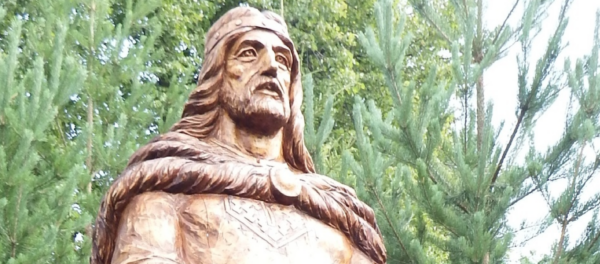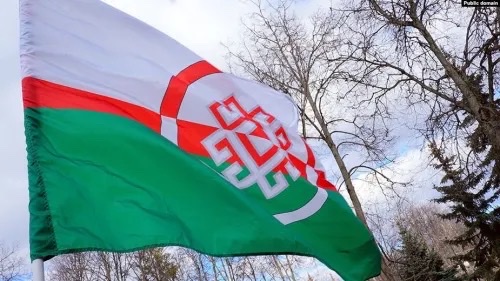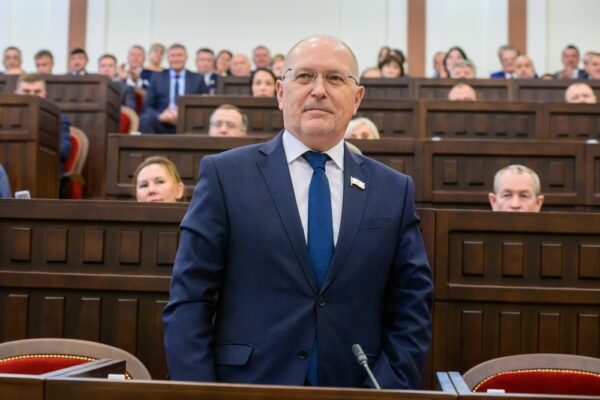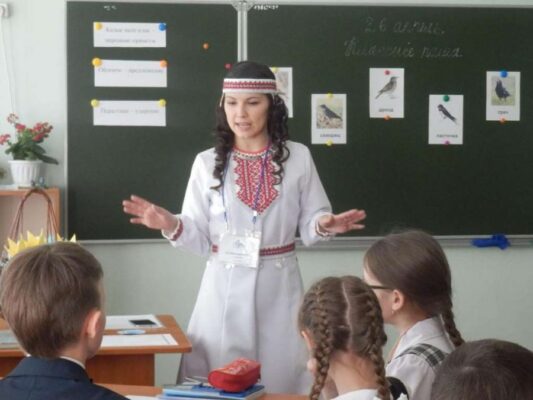12th All-Russian Mari Congress was inexpressive
The 12th All-Russian Congress of the Mari People was held at the National Drama Theatre of the Republic of Mari El from 31 October to 2 November.
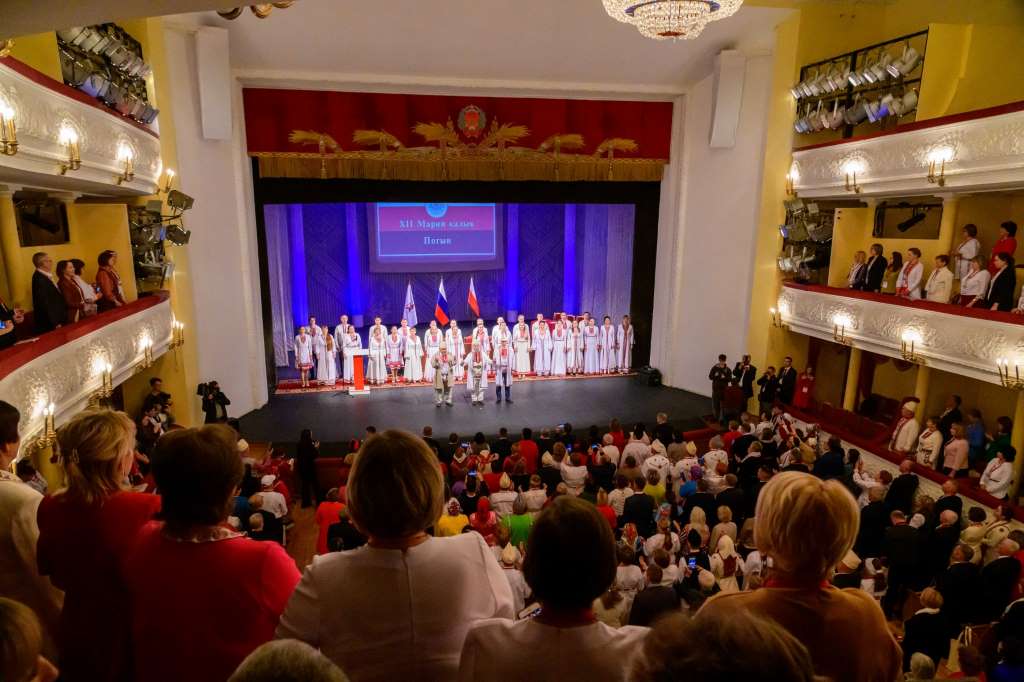
Representatives of the Mari people arrived from 19 regions of the Russian Federation, a total of 430 delegates. The largest delegation to arrive from elsewhere was from Bashkortostan with 82 delegates. From Mari El, on the other hand, 250 delegates were elected. The oldest delegate was 81 years old, who turned out to be the leader of the Mari karts (sacrificial priests), Alexander Tanygin. The youngest delegate was 19 years old. The largest number of delegates, 145 in total, came from the field of education, 130 from the field of culture and arts. A total of 40 delegates represented the state. Also, 18 delegates were from the business community.
Mari Congress: first half
31 October was the day of the inauguration. On the same day met the Council Mer Kangash, which was elected at the previous Congress. On the morning of 1 November, the Mari Park was inaugurated in Yoshkar-Ola. It features a number of wooden sculptures of figures from Mari folk culture and the construction of a small Mari folk-style singing and dancing field. The first half of the day was devoted to the plenary session of the Congress. As is tradition, this began with a prayer by the Mari karts. The prayer was followed by the singing of hymns and welcoming speeches by dignitaries.
Welcoming speeches
First, the Head of State of the Republic of Mari El, Yuri Zaitsev, gave his welcoming speech. He said that the Congress is the main social platform of the Mari, which discusses issues of the Mari ethnicity in the social, economic, political and cultural spheres. At these congresses, important decisions are taken, and documents and projects are developed that help to raise the national consciousness of the Mari, and ethnically and spiritually consolidate them, stressed Zaitsev and assured that the Government of Mari El is well aware of its role in the preservation and development of the Mari language, culture and traditions of the Mari people.
At the same time, Zaitsev expressed the hope that the decisions of the Congress would contribute to the prosperity of ‘our great Russia’. He went on to award distinguished Mari, such as the chairman of the Mari Council, Oyozha Eduard Alexandrov with the Order of Merit for Services to the Mari People. Alexandrov is also a deputy to Mari El’s legislature and chairman of the committee on culture, tourism and sports.
Zaitsev was followed by the Speaker of the Legislative Assembly of Mari El, Mikhail Vasyutin, who expressed his conviction that the Congress would be engaged in the improvement of various spheres of the life of the ethnos, based on the current legislation, which would also contribute to the strengthening of interethnic friendship and ties with other regions of the Russian Federation. He, too, honoured the best Mari who stood up for their language and culture with awards from the Mari El Legislative Assembly, with more than half of the awards going outside the republic. Most of the recipients were educationists.
Mari Congress: second half
The welcoming speeches were followed by work in sections. As the President of the Russian Federation, Vladimir Putin, had proclaimed this year the Year of the Family in Russia, all the sections were related to the family. In the evening, there was a performance of Kengesh yüd (‘Midsummer Night’) at the Mari National Theatre.
On the last day, a new Congress Council, Mer Kangash, and the Chairman of the Council, Onyozha, were elected. Eduard Alexandrov, who has been in office since 2016, was re-elected. Out of 385 delegates present, 346 voted in his favour. The Onyozha was presented by the head kart with the traditional Mari headdress of honour, terkupsh, a loaf of bread and a wish for strength. Sixteen members were elected to the Council, three of whom are deputies of the Onyozha. The Congress heard summaries from the section leaders and endorsed the resolution. Finally, there was a festive closing concert of the Mari children’s and youth ensembles at the Mari Academic Ballet and Opera Theatre.
Impressions of the Mari Congress
The congress was highly planned. There were no random speeches, no debate or discussion. The whole agenda, as well as those who spoke at the Congress, were approved by the Organising Committee and the Government. The opposition representatives reproached Mer Kanash for not standing up for the Mari. For example, there has been no response to public insults of the Mari people by Russian journalists and businessmen over the past four years.
Nor have the leaders of the Mari people spoken out about the fact that the memorial plaques to the fallen in the war against Ukraine are only in Russian. This is, in fact, a violation of the law. There have also been opinions that it is better to spend money on military action against Ukraine than on organising such pointless, inconclusive congresses. What was said at the congress and what is contained in the resolution has not yet been made public.
The congress was held in Mari, with most of the presentations in sections also in Mari. But there were Russian greetings at the Congress, and some of Hill Mari may have spoken in Russian. The draft resolution was also discussed in Russian.
National autonomy ‘The Mari of Russia’
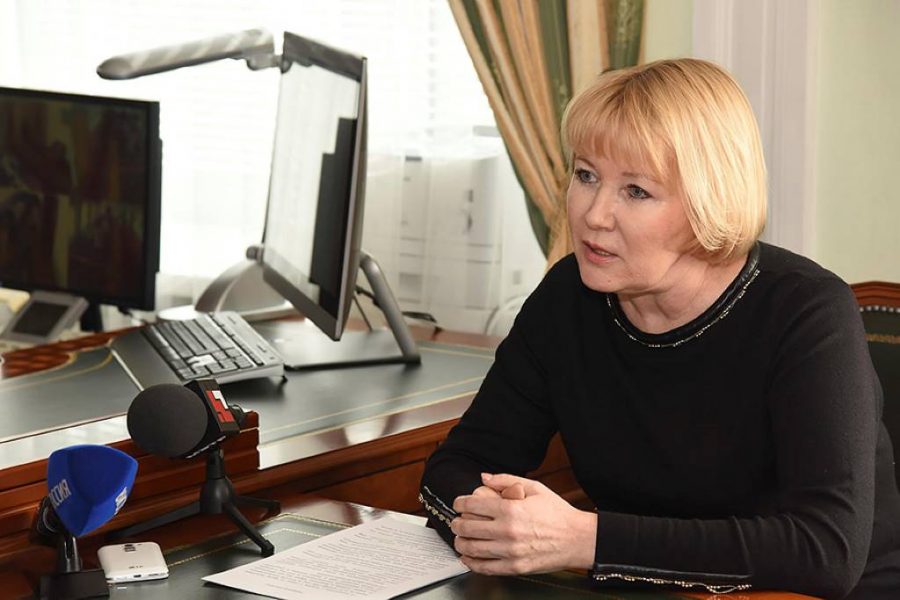
During the Congress, a session of the Federal Council of the National Autonomy “The Mari of Russia” was held. During the session, Larissa Yakovleva was re-elected as its chairwoman, who a member of the Mari Parliament. The autonomy was established in 2014 and registered in 2015. It includes regional cultural autonomies of Simferopol city, Kirov, Leningrad, Nizhny Novgorod, Sverdlovsk oblasts, Udmurtia, Tatarstan and Bashkortostan Mari. The national cultural autonomies of Dagestan and Altai oblasts were accepted as new members.
- В Марий Эл проходит Съезд народа мари (01.11.2024 MariUver, in Russian)
- Съезд марийского народа в Йошкар-Оле собрал около 430 делегатов из регионов РФ (01.11.2024 Kidsher, in Russian)
- В ХII Съезде марийского народа принимают участие делегаты из 19 регионов России (01.11.2024 Mari El Ministry of Culture, Media and Nationalities, in Russian)
- XII Всероссийский Съезд марийского народа начал свою работу (01.11.2024 gsmari.ru, in Russian)
- Съезд и суть марийских общественников (02.11.2024 MariUver, in Russian)
- Лариса Яковлева переизбрана председателем совета федеральной автономии «Марийцы России» (02.11.2024 Kidsher, in Russian)
- Эдуарда Александрова в третий раз избрали председателем Всемарийского совета (02.11.2024 Kidsher, in Russian)
- Завершил работу XII Съезд марийского народа (02.11.2024 Mari El Ministry of Culture, Media and Nationalities, in Russian)
- В работе съезда марийского народа в Марий Эл принимают участие более 400 человек (02.11.2024 Mari Media, in Russian)
- Оньыжой избрали Эдуарда Александрова (03.11.2024 MariUver, in Russian)
- ХII Всероссийский съезд марийского народа завершил свою работу (03.11.2024 Centre of Mari Culture, in Russian)
